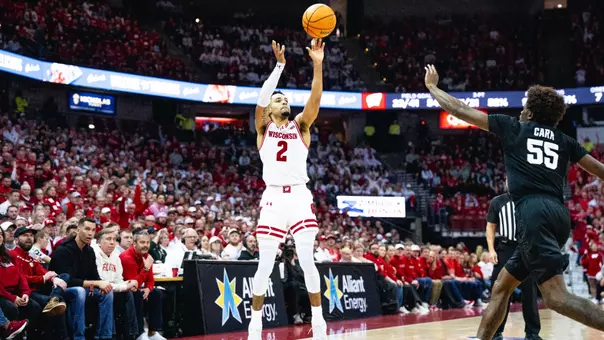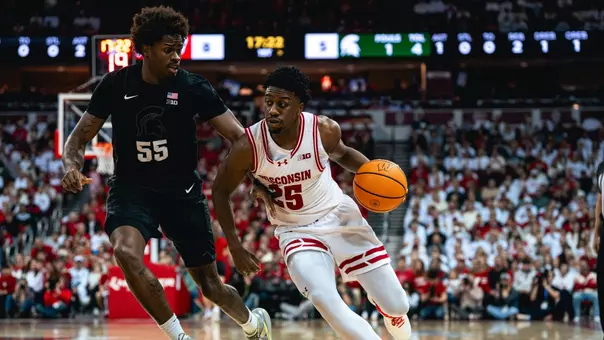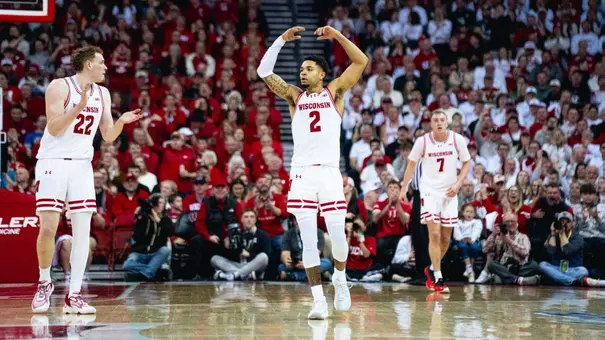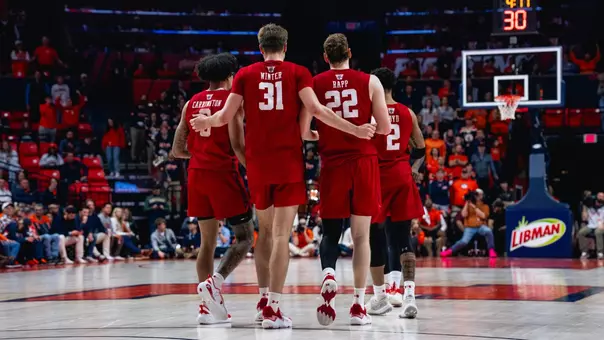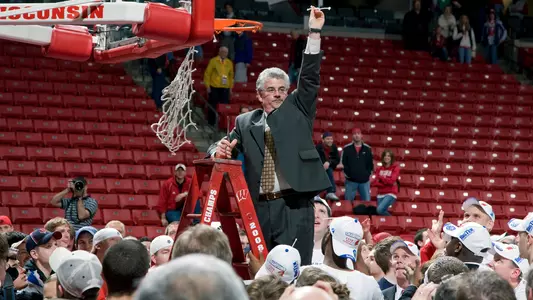
Honoring the Soul of a Program: Perez-Guerra Retires
August 04, 2021 | Men's Basketball, Andy Baggot
After 28 years, the Badgers tell longtime athletic trainer just how much they care for him
BY ANDY BAGGOT
UWBadgers.com Insider
MADISON, Wis. — What would our lives be like if we all had someone like Henry Perez-Guerra in it?
Someone genuine, trustworthy and selfless.
Someone unflappable, tireless and decent.
Someone who doesn't judge, disparage or deride.
Someone who cares more about who you are – what you can become – than what you are.
Josh Gasser began entertaining such a question in June of 2010, his first official day in Madison as a member of the Wisconsin men's basketball team.
He and three freshmen teammates – Evan Anderson, Ben Brust and Duje Dukan – had just climbed into Perez-Guerra's late-model Toyota Camry and made the 10-minute ride from the Kohl Center to UW Hospital and Clinics. That's where the four teenagers embarked on an hours-long process where, one by one, they underwent physicals. That made for a lot of get-acquainted time in the waiting area where Gasser soon realized that Perez-Guerra, an athletic trainer at his alma mater since 1992, was no ordinary chaperon.
"We very quickly realized that he was going to be far more than the guy who tapes your ankles,'' Gasser said.
Perez-Guerra inquired about their families and backgrounds. He tapped into their interests and motivations. He asked about their friends and the paths they had traveled to get to this point. The topic of basketball, a sport Perez-Guerra loves, never came up.
Gasser, a steely point guard from Port Washington, was struck by the "authentic approach'' Perez-Guerra took to communicating with the newbies. He was thoughtful, patient, earnest and respectful.
"You felt like he genuinely cared about you,'' Gasser said.

That vibe became more prominent in the coming weeks and years as Gasser and Co. gradually immersed themselves in the unique culture of Badgers basketball.
"You could tell on Day One in the locker room how much the upperclassmen respected him and enjoyed hanging out with him in the training room,'' Gasser said of Perez-Guerra. "You could tell right away how much he was loved and respected by everybody in the program.''
The bottom line, Gasser learned, is that Perez-Guerra is someone special.
"He was going to be an ally for you, a friend throughout your entire college career and that's what he was,'' Gasser said.
That was the case in good times, like when Wisconsin made a stirring NCAA Final Four run in 2014, and in bad, like when Gasser sustained a knee injury during an October practice session and missed the entire 2012-13 season.
That will be the case forever, Gasser said, a gift that will hold its immeasurable value even as Perez-Guerra embarks on another chapter of his life.
Without fanfare, Perez-Guerra, 60, retired in June with an eye toward spending more time with his family – wife Jill, son Casey, daughter Carlie, stepson Andrew Hannawell – and his ever-expanding love for the outdoors. He said he won't miss the constant travel, but he will need some time to adjust to the lack of day-to-day interaction with the student-athletes.
Perez-Guerra said he will gladly help his replacement, UW grad Brent Neuharth, if needed, but he definitely won't be under foot.
"I wish I could go back and be able to talk to every single person I had a chance to interact with,'' Perez-Guerra said of his time at UW, which includes a bachelor of science degree in physical education in 1985 and a master's in health education in 1995. "Maybe sometime, in some way, I'll be able to do that over the course of my retirement. That would be a cool thing.''
Not to mention lengthy. All those players, coaches, administrators, student trainers, media members, parents, colleagues and physicians that crossed paths with Perez-Guerra would have something in common.
"I don't think I've met a person who has a bad word to say about Henry,'' Gasser said.
"Guys would go to the ends of the earth for Henry,'' said Jordan Taylor, a two-time All-Big Ten Conference guard from Bloomington, Minnesota, whose UW career spanned 2009 to '12. "If he needed something, I don't think there's anyone in the program who wouldn't find a way to make it happen. He'd do the same for us.''
That reality can be traced back to that day in the waiting area at UW Hospital where Perez-Guerra, the son of a well-traveled Air Force physician who lived in Michigan, South Carolina, Colorado, Alaska and Texas before settling in La Crosse, did what comes naturally. He made everyone feel comfortable.
"For me it was important as they were coming in as freshmen to get to know them and establish at least a little bit of trust,'' Perez-Guerra said. "You have to get to know them. What their interests are. What their family's like. My philosophy was family was first, education second, and basketball was third. To be able to help someone you have to understand all three to do a good job.
"My goal was always to interact as a person who wasn't part of the basketball staff and that I was there for them. Whatever they needed, I would do my best to try and help them out.''
It didn't matter the person's profile – star, starter or reserve – or what they could offer Perez-Guerra in return.
"Henry is so much more than a trainer,'' said Sharif Chambliss, a guard from Racine who was the UW captain in 2005 and who joined Coach Greg Gard's staff as an assistant in May. "He was our psychologist. He was our confidante. He was someone we could talk to about anything. Just knowing how much he cared about each individual, I think everybody has their own personal relationship with him.''
News of Perez-Guerra's decision didn't come as a surprise to guard Brad Davison, who said his friend had spoken of retirement multiple times in recent years, targeting this moment in part because he and a large senior class, including Davison, would be leaving together.
But Davison took advantage of a COVID-19 edict and re-upped for a fifth season – the only one of seven seniors to do so – leaving a huge hole in his social dance card. He's so tight with Perez-Guerra that whenever they speak on the phone or in person, the conversation ends with an "I love you.'' Hearing Perez-Guerra confirm that he was stepping down was hard on Davison.
"Definitely an emotional day,'' he said.
Davison stopped short of saying farewell to Perez-Guerra.
"I'll never say goodbye to Henry,'' he said.
𝒟𝑒𝒶𝓇 𝐻𝑒𝓃𝓇𝓎,
— Wisconsin Basketball (@BadgerMBB) March 12, 2019
It's been a little over one year since @braddavi34's surgery, which challenged him physically and mentally
He didn't face it alone
It's National Athletic Training Month and Brad wanted to personally say thank you to our own Henry Perez-Guerra. #NATM2019 pic.twitter.com/uEmw1cADau
How was Perez-Guerra able to get on the same wavelength with so many different personalities over the years? That process unfolded in his sanctuary, the athletic training room at the Kohl Center located on the lower-level passageway not far from the men's basketball locker room.
"When you're in the training room, before practice or after practice with the guys, you're talking about a bunch of stuff whether it's personal stuff, what we're going to do this weekend, how pissed you are at a coach and he's there, listening to it all,'' Gasser said.
"Everyone trusted Henry, that he was going to impose good wisdom on you, good advice, but also that you could trust him in terms of having real conversations with him and try to get through some tough times whatever they might be. He always had your back. Everybody respected him because of that.
"There's a lot of highs and lows that go into a basketball program and I think Henry was always a staple of being the guy you could always go to no matter who you were.''
Gasser said recruits should look beyond who their coaches and teammates are going to be when choosing a school.
"I don't think people realize how much time you don't spend with your coaches and how much time you do spend with people like Henry,'' he said. "When you're picking a school – where you're going to go – you're often thinking, 'Do I like the head coach? Do I like the assistant coaches? Do I like the players?'
"But you spend more time with people like Henry – Henry specifically – than anyone else in the program. You're with him before practice, during practice, after practice. You're with him the entire summer. To have someone like that who is so respected and makes you feel so comfortable and makes you want to come to practice every day and get treatment every single day is huge.''
Perez-Guerra shared his world with the student-athletes, but only to a certain degree. Most everyone knew the pride he had in 26-year-old Carlie, a behavioral specialist who works with autistic children, and the concern he had when 22-year-old Casey enlisted in the Army in 2016 and was deployed to Afghanistan in 2018.
"No matter what was going on in his life, he wanted to help people,'' Taylor said. "Even when it was a bad day for him – and you could sense that – he would go out of his way to make sure you were having a good day. He was always filling you up and giving you energy.''
Said Gasser: "Most days the first question he would ask would be, 'How are you doing?' He would never let me just answer, 'I'm fine.' He'd always make you go beyond that. He'd want to know how you're really doing.''
Said Taylor: "Even if it's a short conversation, he has a way of getting things out of you and making you feel like he truly cares. He's just a special person in terms of how he relates to people.''
Gasser, Taylor, Chambliss and Davison share an unbreakable bond with Perez-Guerra. All dealt with major injuries during their UW careers and all bared their competitive souls to him.
For Gasser, it was a torn anterior cruciate knee ligament that ruined his junior season.
"We spent hours upon hours together every single day,'' he said of Perez-Guerra. "That included holidays. That included the three weeks that we usually get to go home in the summer and see our families. It was just him and I. We had some good times and had some bad times where we'd get frustrated with each other.
"No one really knew what I was going through. No one knew how difficult it was outside of me and Henry. He said, 'This is going to be tough. I don't know if you're going to get back to that level again. I don't know if you're going to play again.' It was a tough injury, so we had to have some tough conversations about the stuff I was going to need to do.
"He was willing to put in the extra time to see me get back on the court and live out my dream. I can't thank him enough for everything he's done.''
For Taylor, it was a chronic ankle injury that required surgery prior to his senior season.
"He really helped me through that process,'' Taylor said.
It was an experience that included a surprising outburst of emotion from Perez-Guerra. The Badgers were playing a friendly game of ultimate Frisbee at Camp Randall Stadium when Taylor, still in recovery mode, tried to join in. Perez-Guerra reacted angrily.
"I'd never seen him snap like that before,'' Taylor said. "I realized that he cared and just wanted me to get better.''
For Chambliss, it was a torn ACL sustained in practice after he'd transferred from Penn State for his senior season in 2003.
"We had a chance to really get to know each other,'' Chambliss said of Perez-Guerra. "I found out how hard I had to work to get where I wanted to go and Henry understood that and he was going to make sure that I did all that and some.
"When you go through a significant injury, the first thing anybody can do is console you and Henry did. The first thing he said was, 'You're going to be all right.'"
For Davison, from Maple, Grove, Minnesota, it was a series of shoulder injuries that complicated his freshman season in 2017 and eventually required surgery.
"That was one of the most emotional, roller-coaster years that I've been a part of,'' Davison said.

"That was one of the most emotional, roller-coaster years that I've been a part of,'' Davison said.
"I would say thankfully it gave me the opportunity to spend a lot of time in his training room, which meant I also spent a lot of time with Henry. We got to have some great, intentional conversations and I had to put my trust in him right away.
"Physically there was pain and different hardships I was going through with my shoulder, but just the mental aspect of not being able to practice and not being able to do certain things and having to wear a sling.
"There was a lot of emotional, tearful moments during the year, but really, the hardest part of that whole recovery process was the rehab. He was always the one who had to play the bad guy and hold me back.''
Perez-Guerra had several role models in his career, most notably his father Francisco, a pulmonologist who still practices at the age of 85; long-time UW athletic training supervisor Gordon "Doc'' Stoddard; and his wife Jill, a retiree who taught and served as an athletic trainer at Madison Memorial High School. The lessons they taught him help produce a humble, caring, thoughtful man.
"He's one of those guys that once you get to know him, you'll never forget him,'' Chambliss said.
"To me, he's a brother and a friend that I will continue to do life with for the rest of our lives,'' Davison said.
"I could go on forever about this,'' Gasser said.
What would our lives be like if we all had someone like Henry Perez-Guerra in it?
"If everyone were like him,'' Taylor said, "the world would be a better place.''

